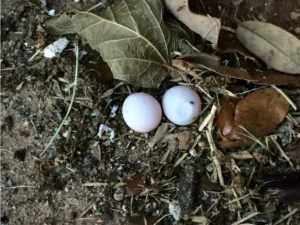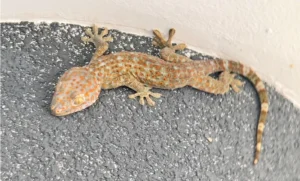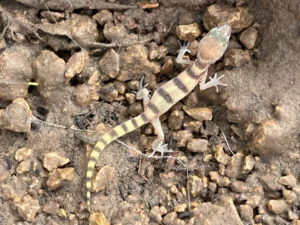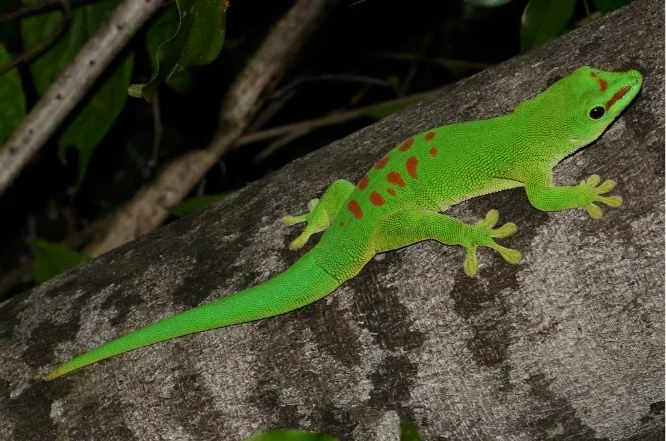It’s late, and your gecko has been acting a little different all day. She’s been digging in the corner of her tank, moving bits of substrate like she’s looking for the perfect spot.
Then she stops, stays still for a moment, and lays two small, white eggs. You watch her, curious, wondering what she’ll do next. Will she sit beside them like a bird? Guard them? Keep them warm? Or… just walk away?
No, geckos do not care for their eggs after laying them. Once a female gecko has laid her eggs, her job is basically done. She doesn’t guard them, incubate them, or check back on them. In most species, the eggs are left completely on their own from the moment they’re laid.
That might sound harsh to us, but for geckos, it’s normal. Their survival doesn’t depend on taking care of their eggs. It depends on laying eggs that can survive on their own, hidden in safe spots where predators won’t find them.
Why Geckos Leave After Laying Eggs
Geckos are “oviparous,” which just means they lay eggs instead of giving birth to live babies.
But unlike mammals or birds, reptiles usually don’t spend time taking care of their eggs or babies. Once the eggs are laid, the female focuses on staying alive herself.
In the wild, sticking around could actually put the eggs in danger. Many geckos hide their eggs under rocks, in tree bark cracks, or buried in moist soil.

If the mom stayed nearby, her smell or movement could attract snakes, insects, or other predators. By walking away, she’s actually helping her eggs survive.
This has worked for millions of years. The fewer clues she leaves behind, the better the eggs’ chances of staying hidden until they hatch.
Baby Geckos Can Handle Life on Their Own
One of the coolest things about geckos is how independent their babies are. When a baby gecko hatches, it’s on its own. No feeding, no cleaning, no warmth from a parent. It just knows how to hunt, hide, and survive.
Leopard gecko babies start catching tiny crickets within days. Crested gecko babies climb and explore right away. They’re just smaller, more fragile versions of adults.
This independence is why geckos can survive in deserts, rainforests, and even cities. Each egg is like a tiny survival kit, ready to handle temperature changes, moisture, and even a little disturbance without mom or dad.
Are There Any Exceptions?
Yes, but they’re rare. Most geckos leave their eggs, but a few species do something a little different.
Some day geckos from Madagascar sometimes lay eggs in shared safe spots and reuse the same place over and over. That’s not full parental care, but it shows that the females trust that spot to be safe.
Then there’s the Tokay gecko. Female Tokays have been seen guarding their eggs, staying nearby, and even chasing off threats. Sometimes the male sticks around too.

After the eggs hatch, adults have even been seen hanging around for a little while, offering a bit of protection.
Female house geckos sometimes linger near their eggs for a short time too, almost like they’re checking everything is okay before leaving.
But once that moment passes, they leave for good.
These are the exceptions. Most geckos don’t warm, guard, or raise their eggs like birds or some reptiles do.
Why They Don’t Need to Stay
Gecko eggs are tougher than they look. Many have hard shells that protect them from pressure, bacteria, and moisture.
In the wild, a female spends time picking a safe, humid, and stable spot before laying eggs. It’s this careful choice, not ongoing care, that gives her babies the best shot at survival.
Some geckos stick their eggs to rocks, cave walls, or tree trunks, making them hard for predators to move. Others bury their eggs in moist soil, keeping them hidden and insulated.
Even though the mom leaves, she still sets her babies up for a good chance to survive.
How Long Do the Eggs Take to Hatch?
Since moms don’t stay, the environment does the work. Temperature and moisture take care of the eggs.
Depending on the species, eggs can take 30 to 90 days to hatch:
-
Leopard geckos: 35–45 days at warm temperatures
-
Crested geckos: 60–70 days
-
Tokay geckos: up to 90 days
Temperature can even decide whether some baby geckos become male or female.
What Happens After Hatching?
Once baby geckos come out, they’re on their own. They don’t wait for mom. In captivity, if you leave hatchlings with adults, the adults might ignore them or see them as food.
In the wild, hatchlings scatter right away. They find food, hide, and start their own lives. Their small size and camouflage help keep them safe.
Why This Works in Nature
At first, it might seem weird that geckos don’t protect their eggs, but it’s smart. By laying eggs in hidden spots and leaving, the mom keeps predators from learning where to look.

This “lay and leave” strategy also lets her lay more eggs multiple times a year. Instead of spending energy guarding one batch, she can lay several, giving more babies a chance to survive.
In places where food and safety are unpredictable, this works better than caring for a few eggs for a long time. Nature isn’t focused on nurturing, it’s focused on giving the eggs the best chance to survive.
Caring for Gecko Eggs in Captivity
If your pet gecko lays eggs, it’s up to you to take on the role she won’t. Gecko eggs can be delicate, but with the right setup, they can hatch safely.
Here’s what most keepers do:
-
Provide a moist egg-laying box: A small container with damp moss or vermiculite for the female to lay her eggs safely.
-
Move the eggs carefully: Put them in an incubator or leave them if conditions are stable.
-
Control temperature and moisture: Helps the embryos grow properly.
-
Don’t rotate or shake the eggs: It can mess up the embryo inside.
It’s really just copying what nature does: steady warmth, steady moisture, and no disturbances.
What About Live-Bearing Geckos?
Not all geckos lay eggs. Some, like the New Zealand geckos (Naultinus and Hoplodactylus), give birth to live babies. Even then, there’s no parental care.
The mother gives birth, and the babies go off on their own.
Whether the gecko lays eggs or has live babies, it’s the same: independence from the very first moment.
Conclusion
So do geckos care for their eggs? No, not in the way we think of care. Once they lay their eggs, they move on. But that doesn’t mean they’re careless.
Their version of care happens before the eggs are laid, in how they pick the perfect spot and make sure the eggs can survive on their own.
In the wild, this gives babies the best chance at life, safe and free from danger. In captivity, it lets us watch a simple but interesting part of nature, a mother gecko trusting the world to finish what she started.
So next time you see your gecko walk away after laying eggs, don’t worry. She’s not abandoning them. She’s doing exactly what evolution taught her: lay her future in a safe spot and let life take it from there.
Hi, my name is Ezra Mushala, i have been interested animals all my life. I am the main author and editor here at snakeinformer.com.

